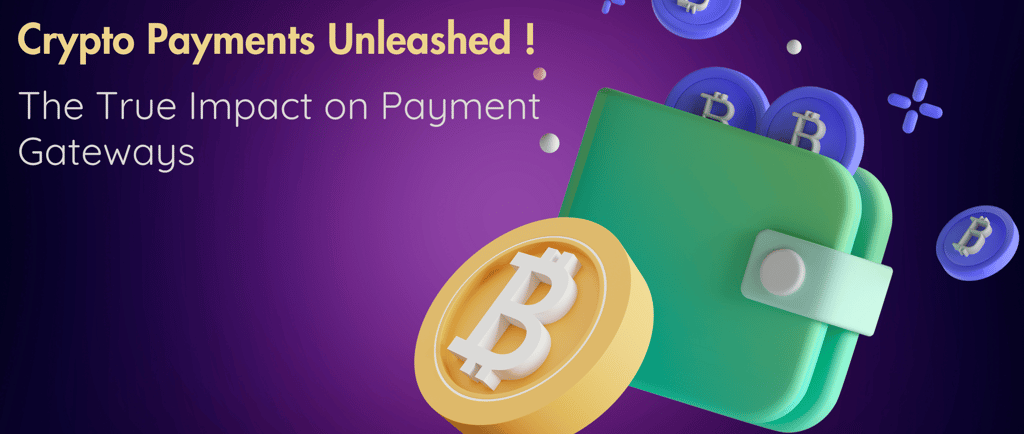Crypto Payments Unleashed: The True Impact on Payment Gateways


The digital landscape is evolving rapidly, and at the forefront of this transformation is cryptocurrency. As digital currencies like Bitcoin, Ethereum, and others gain widespread acceptance, the traditional payment gateway industry is undergoing a significant metamorphosis. The integration of crypto payments into payment gateways is not just a trend; it's a revolution that is reshaping the financial ecosystem. This blog explores the profound impact of crypto payments on payment gateways and what it means for businesses and consumers alike.
1. Enhanced Security and Fraud Prevention
One of the most significant advantages of integrating crypto payments into payment gateways is the enhanced security they offer. Cryptocurrencies operate on blockchain technology, which provides a decentralized and immutable ledger. This technology ensures that transactions are secure, transparent, and nearly impossible to alter. For payment gateways, this means a drastic reduction in fraudulent activities and chargebacks, which are common with traditional payment methods. Businesses can operate with greater confidence, knowing that their transactions are secure.
2. Lower Transaction Fees
Traditional payment processing often involves multiple intermediaries, each taking a cut of the transaction fee. This can lead to high costs for businesses, especially those operating on thin margins. Crypto payments, on the other hand, eliminate many of these intermediaries, resulting in significantly lower transaction fees. Payment gateways that support crypto transactions can pass these savings onto their clients, making it more cost-effective for businesses to accept payments. This cost efficiency can be particularly beneficial for small and medium-sized enterprises (SMEs) looking to optimize their expenses.
3. Speed and Efficiency
Crypto transactions are processed much faster than traditional banking methods, which can take several days to clear. With cryptocurrencies, transactions are typically confirmed within minutes, regardless of the sender's or receiver's location. This speed is a game-changer for payment gateways, allowing them to offer quicker settlement times to their clients. For businesses, this means improved cash flow and the ability to reinvest funds more rapidly, driving growth and innovation.
4. Global Reach and Accessibility
Cryptocurrencies are inherently borderless, enabling seamless cross-border transactions without the need for currency conversions or international banking fees. Payment gateways that integrate crypto payments can offer truly global services, expanding their reach and accessibility. This is particularly advantageous for e-commerce businesses and freelancers who operate internationally. By accepting crypto payments, they can attract a broader customer base and streamline their payment processes.
5. Financial Inclusion
Crypto payments have the potential to bring financial services to the unbanked and underbanked populations around the world. Traditional banking systems often exclude individuals without access to bank accounts or credit cards. Cryptocurrencies, accessible through a smartphone, provide an alternative means of participation in the global economy. Payment gateways that support crypto can tap into this underserved market, fostering greater financial inclusion and empowerment.
6. Adaptability and Innovation
The integration of crypto payments into payment gateways is driving innovation in the fintech industry. Payment gateways are adapting to new technologies and developing solutions that cater to the growing demand for digital currencies. This adaptability is crucial for staying competitive in a rapidly changing market. Moreover, the use of smart contracts in crypto transactions can automate and streamline various processes, reducing the need for manual intervention and increasing efficiency.
7. Challenges and Considerations
While the benefits of crypto payments are substantial, there are also challenges to consider. The volatility of cryptocurrencies can pose a risk to both businesses and consumers. Payment gateways must implement mechanisms to mitigate this risk, such as instant conversion to stablecoins or fiat currencies. Additionally, regulatory compliance is an ongoing concern. As governments and regulatory bodies continue to develop frameworks for cryptocurrency usage, payment gateways must stay abreast of these changes to ensure compliance.
Conclusion
The integration of crypto payments into payment gateways is transforming the way businesses and consumers interact with digital currencies. Enhanced security, lower transaction fees, increased speed, global accessibility, financial inclusion, and ongoing innovation are just a few of the benefits driving this revolution. As payment gateways continue to adapt and evolve, the true impact of crypto payments will be felt across the financial landscape, paving the way for a more inclusive and efficient global economy. Businesses that embrace this change stand to gain a competitive edge, while consumers enjoy more secure and convenient payment options. The future of payments is here, and it's powered by cryptocurrency.
